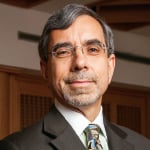2017 Applying to Grad School
THIS GUIDE IS NO LONGER ACTIVE. For the current FP Guide, click here.
Georgetown University, Walsh School of Foreign Service (SFS)
“We want students who are passionate about studying international relations,” says Anthony Arend, senior associate dean for faculty and graduate affairs at Georgetown University’s Walsh School of Foreign Service (SFS). “We also value practical experience in a related field, broadly defined, such as military experience, journalism, Peace Corps service, or a private sector job with an international relations connection.”
Each master’s degree program at SFS manages its own admissions and financial aid processes. Prospective students apply directly to one of the following programs: the Master of Science in Foreign Service (MSFS), MA in Security Studies, Master of Global Human Development, MA in International Business and Policy, or any of five regionally focused MA programs (Arab Studies; Asian Studies; Eurasian, Russian and East European Studies; German and European Studies; or Latin American Studies). Applicants should explain why they are interested studying at SFS and in the particular program they are applying to. Most classes in the MA in Security Studies program are offered in the evening, giving students an option for full-time or part-time work while pursuing their studies.

“Nothing is better than visiting campus, chatting with faculty and students, visiting the career center, and sitting in on a class.” –Anthony Arend, Senior Associate Dean for Faculty and Graduate Affairs, Walsh School of Foreign Service, Georgetown University
Students who do well at SFS often have strong strategic skills, such as leadership, creativity, and networking skills. They also understand the need to take ownership of their educational trajectory and career path. Successful students are able to apply their knowledge and use it to move to the next level.
“GRE scores are a factor in admissions, but they are not decisive,” says Arend. “It’s not like LSAT scores for law school admissions.” Strong performance in college economics classes may compensate for a low quantitative GRE score, and strong writing samples may compensate for a low verbal score. For international students, SFS focuses on TOEFL scores and writing samples.
While SFS does not interview graduate-level applicants, they are strongly encouraged to visit. “Nothing is better than visiting campus, chatting with faculty and students, visiting the career center, and sitting in on a class,” says Arend. International applicants often talk with SFS representatives at a graduate school fair, such APSIA’s upcoming fairs in Vancouver, Tokyo, Taipei, and Seoul.
Arend, who previously served as director of the MSFS program, says the most helpful recommendations come from a person who knows you well and can comment on an aspect of you they know well, such as a professor who knows your academic work or a former job supervisor. “Ideally, the person writing the recommendation is familiar with the program at SFS. If they are an alumni of the program, all the better,” he adds. “Avoid recommendations from big names who don’t know you.”

Master’s Degree Program Options:
• Master of Science in Foreign Service (MSFS)
• MA in Security Studies
• Master of Global Human Development
• MA in Arab Studies
• MA in Asian Studies
• MA in Eurasian, Russian and East European Studies
• MA in German and European Studies
• MA in Latin American Studies
• MA in International Business and Policy
Application Deadlines, Standard Exam Scores, and Recommendation Letters:
See http://sfs.georgetown.edu/graduate/graduate-admissions for links to individual program admissions pages.
Application Checklists: See http://sfs.georgetown.edu/graduate/graduate-admissions for a list of materials required for all SFS programs. Program-specific materials are also required: See individual program admissions websites.
To receive school information, see request info.
Contents
- 2017 Applying to Grad School
- Association of Professional Schools of International Affairs (APSIA)
- Georgetown University, Walsh School of Foreign Service (SFS)
- University of Denver, Josef Korbel School of International Studies
- American University, School of International Service (SIS)
- Johns Hopkins University, School of Advanced International Studies (SAIS)
- Middlebury Institute of International Studies at Monterey
- University of Washington, The Henry M. Jackson School of International Studies